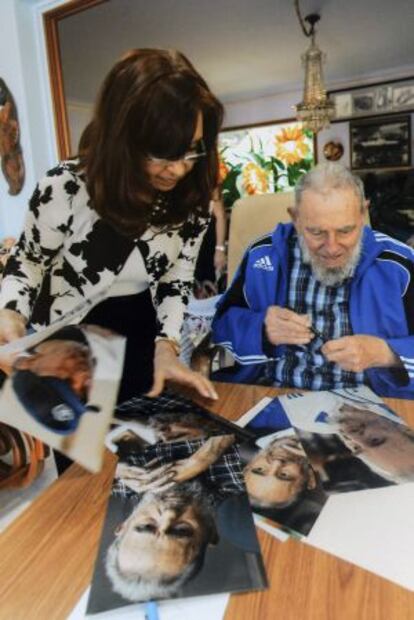Cuba jumps back into the regional diplomatic realm
Havana hosts 31 Latin American and Caribbean leaders for CELAC summit


Cuba officially jumped back into the regional diplomatic framework as the Communist-ruled island began hosting on Tuesday the Community of Latin American and Caribbean States (CELAC) summit.
Cuban President Raúl Castro was expected to appear later Tuesday for the family portrait of the leaders and government representatives who will attend the two-day summit in Havana. It could be tremendous diplomatic coup for Cuba, which has been making headway in recent months in its bid to re-establish or strengthen ties with certain countries that have traditionally taken a cool stance on the Castro regime.
The Cuban government has been taking small steps in recent years to demonstrate its willingness to allow more economic freedoms for its citizens, including lifting prohibitions on renting properties and foreign travel. Nevertheless, political freedoms are still restricted. For this reason, Cuban dissidents have publicly come out against the celebration of CELAC because they believe that summit will only serve to legitimize the hardline communist regime.
While many countries have criticized Cuba’s human rights record, no regional leader has suggested meeting with the opposition during their stay for the summit. The Costa Rican delegation said it was considering whether to hold a meeting with dissidents.
For the first time since 1959, the head of the Organization of American States (OAS) will travel to Cuba. Havana was kicked out of the OAS in 1962 at the behest of President John F. Kennedy, but it was welcomed back in 2009 on the condition that Raúl Castro initiates an open dialogue and observes the organization’s charter in respecting “representative democracy.” But Castro didn’t accept the outstretched hand, saying that the OAS was dominated by the United States, where OAS has its headquarters in Washington.
The summit will also provide the opportunity for Mexico to strengthen its relations with Cuba
At least 31 heads of states from the 33 CELAC member nations have confirmed their attendance. Most American nations are members, with the big exceptions of the US and Canada.
Chilean President Sebastián Piñera, whose presence was not initially confirmed, will meet with his Peruvian counterpart Ollanta Humala in Havana on Wednesday to discuss the International Court of Justice ruling setting new maritime limits between both countries, news agency Efe reported.
Only Panamanian President Ricardo Martinelli, a conservative, has said he will not attend in protest of last year’s capture of a North Korean ship in the Panama Canal that was carrying Cuban weapons in violation of a UN arms embargo. There was a brief diplomatic spat between Panama and Cuba at a pre-summit meeting over the inclusion of a special recognition of the late Venezuelan President Hugo Chávez, the founder of CELAC. Chávez died last March of cancer. In the end, the homage has been left intact in the declaration.
Among the issues that will be discussed at the summit are the ongoing peace talks between the Revolutionary Armed Forces of Colombia (FARC) and the Bogota government, as well as a proposal presented by Venezuela to invite the US Caribbean territory of Puerto Rico to become a CELAC member.
The summit will also provide the opportunity for Mexico to strengthen its relations with Cuba. Mexico is the only country never to have broken off diplomatic relations since the Cuban revolution and has maintained strong economic ties with the island. However, relations were strained in 1999 when then-Foreign Secretary Rosario Green met with dissidents during the Ibero-American Summit. Differences were patched up during the conservative governments of Vicente Fox and Felipe Calderón.
But current Mexican President Enrique Peña Nieto, of the Institutional Revolutionary Party (PRI), has said that wants to re-establish the relationship that Mexico once enjoyed with Cuba.
The first to arrive in Havana was Argentinean President Cristina Kirchner de Fernández who met with former Cuban President Fidel Castro at his home on Saturday. The Argentinean leader’s visit comes as her country is enmeshed in a swirling financial crisis stemming from the devaluation of the peso.
Argentina’s presidential office in Buenos Aires handed out a photo showing the two of them chatting and signing photographs.
Tu suscripción se está usando en otro dispositivo
¿Quieres añadir otro usuario a tu suscripción?
Si continúas leyendo en este dispositivo, no se podrá leer en el otro.
FlechaTu suscripción se está usando en otro dispositivo y solo puedes acceder a EL PAÍS desde un dispositivo a la vez.
Si quieres compartir tu cuenta, cambia tu suscripción a la modalidad Premium, así podrás añadir otro usuario. Cada uno accederá con su propia cuenta de email, lo que os permitirá personalizar vuestra experiencia en EL PAÍS.
¿Tienes una suscripción de empresa? Accede aquí para contratar más cuentas.
En el caso de no saber quién está usando tu cuenta, te recomendamos cambiar tu contraseña aquí.
Si decides continuar compartiendo tu cuenta, este mensaje se mostrará en tu dispositivo y en el de la otra persona que está usando tu cuenta de forma indefinida, afectando a tu experiencia de lectura. Puedes consultar aquí los términos y condiciones de la suscripción digital.








































